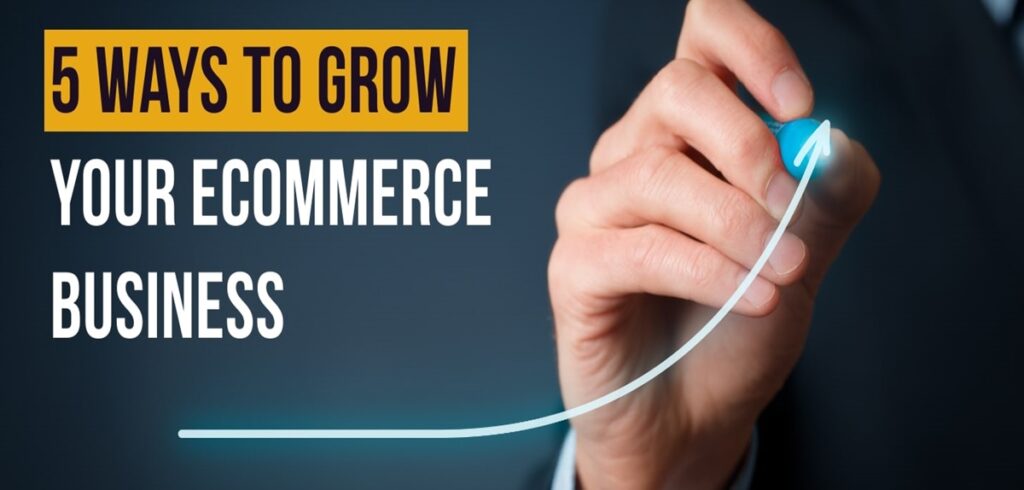Key Takeaways:
- Expand your business through international commerce to reach a broader audience.
- Optimize checkout to reduce cart abandonment and increase conversions.
- Personalize customer experiences for higher satisfaction and loyalty.
- Go headless to improve flexibility and integrate new technologies.
- Implement wholesale ecommerce to streamline B2B operations.
How to Grow Your Ecommerce Business: 5 Proven Ways to Achieve Success – With online shopping becoming a preferred choice for millions, ecommerce businesses have a significant opportunity for growth. However, success in the ecommerce industry requires more than just setting up an online store. Companies need to adopt innovative strategies to reach their full potential.
In this blog, we will explore five proven ways to grow your ecommerce business and achieve long-term success. These strategies include expanding into international markets, optimizing checkout processes, incorporating personalization, going headless, and leveraging wholesale ecommerce.
1. International Commerce: Expand Your Reach – One of the most effective ways to grow your ecommerce business is by going global. International commerce allows businesses to tap into new markets and significantly expand their customer base. By offering your products or services to global audiences, you can increase sales and build a recognizable brand.
Ecommerce platforms today offer tools to help you localize content for different regions, including language customization, currency conversion, and regional-specific marketing. Whether it’s translating product descriptions or adapting your shipping options, tailoring your online store to international customers can enhance their shopping experience.
Here’s an example: A company selling home décor items in the US decided to expand its operations to Europe. By customizing their website for European customers, offering localized payment options, and adjusting delivery times to match the expectations of the region, the business saw a 40% increase in sales within the first six months.
2. Wholesale Ecommerce: Streamline B2B Operations – Wholesale ecommerce has become an increasingly popular model for businesses looking to expand beyond retail. With a B2B approach, businesses can supply products in bulk to other companies, creating long-term partnerships that drive consistent revenue.
Going wholesale online means you can automate and streamline processes such as bulk ordering, shipping, and inventory management. Businesses like Alibaba have been successful because they cater to large buyers through their online platforms, offering them a seamless experience when purchasing in bulk.
Imagine running a cosmetics company. Instead of only selling individual products to consumers, you could offer wholesale options to beauty salons and retailers. By simplifying your ecommerce platform for wholesale buyers, including flexible payment options and bulk order discounts, you will open up new revenue streams while building a solid base of repeat customers.
3. Checkout Optimization: Reduce Abandonment Rates – Cart abandonment is a significant challenge in ecommerce. Studies show that the average cart abandonment rate hovers around 70%. One of the main reasons for this is a complicated checkout process. Customers want simplicity and speed, especially when making purchases online.
Optimizing your checkout page can drastically reduce cart abandonment and improve conversions. Offering a guest checkout option is essential for first-time buyers who may not want to commit to creating an account immediately. Keep the checkout page clean, minimize the number of fields, and ensure that customers can easily select their preferred payment option.
For example, Apple’s ecommerce platform offers a one-click checkout for users with Apple Pay, reducing the friction between decision-making and payment. This type of efficiency encourages customers to complete their purchases quickly.
Ready to grow your ecommerce business? Subscribe to get more tips straight to your inbox!
4. Ecommerce Personalization: Create Tailored Experiences – Did you know that 80% of consumers are more likely to buy from a brand that provides personalized experiences? Personalization is no longer a luxury; it’s an expectation. By tailoring your content, product recommendations, and marketing campaigns to individual preferences, you can boost engagement and drive sales.
Utilizing AI-powered tools can help you personalize the shopping experience by analyzing customer behavior, past purchases, and browsing patterns. This allows you to recommend relevant products and send personalized marketing messages that resonate with your audience.
An example of successful personalization can be seen with Amazon’s recommendation engine, which suggests products based on users’ browsing and purchase history. This not only improves the shopping experience but also increases the likelihood of repeat purchases.
5. Go Headless: Enhance Flexibility and Innovation – Traditional ecommerce platforms often come with limitations when it comes to customization and flexibility. That’s where headless commerce comes into play. Headless ecommerce separates the frontend (what customers see) from the backend (the system that powers your store), giving businesses more control over the user experience.
With headless architecture, you can build a unique, customized website while still maintaining robust backend functionality. This flexibility allows you to integrate advanced features like mobile apps, voice commerce, and AI-driven customer support, creating a seamless omnichannel experience.
For example, a clothing retailer may use headless commerce to create a custom mobile app, offering shoppers a unique experience that’s fully integrated with their existing ecommerce platform. This setup not only improves user experience but also increases customer engagement and retention.
Practical Tips for Growing Your Ecommerce Business:
- Leverage social media marketing to drive traffic to your online store.
- Use email marketing campaigns to keep customers engaged and informed about new products or discounts.
- Optimize your website for mobile to ensure a smooth shopping experience across devices.
- Focus on customer service by providing easy ways for customers to contact support.
- Test different pricing models to find what works best for your target audience.
Growing an ecommerce business takes time, effort, and a clear strategy. By expanding your reach through international commerce, optimizing your checkout process, offering personalized shopping experiences, embracing wholesale ecommerce, and upgrading to headless architecture, you can position your business for long-term success.
Remember, the key to growth is staying adaptable and continually improving your operations to meet the changing demands of your customers. By implementing these five proven strategies, you’ll not only boost your sales but also create lasting relationships with your customers.
Want more tips on growing your ecommerce business? Subscribe to our newsletter for expert advice delivered straight to your inbox!
What do you think of these strategies? Share your thoughts or ask any questions in the comments below! We’d love to hear from you.





